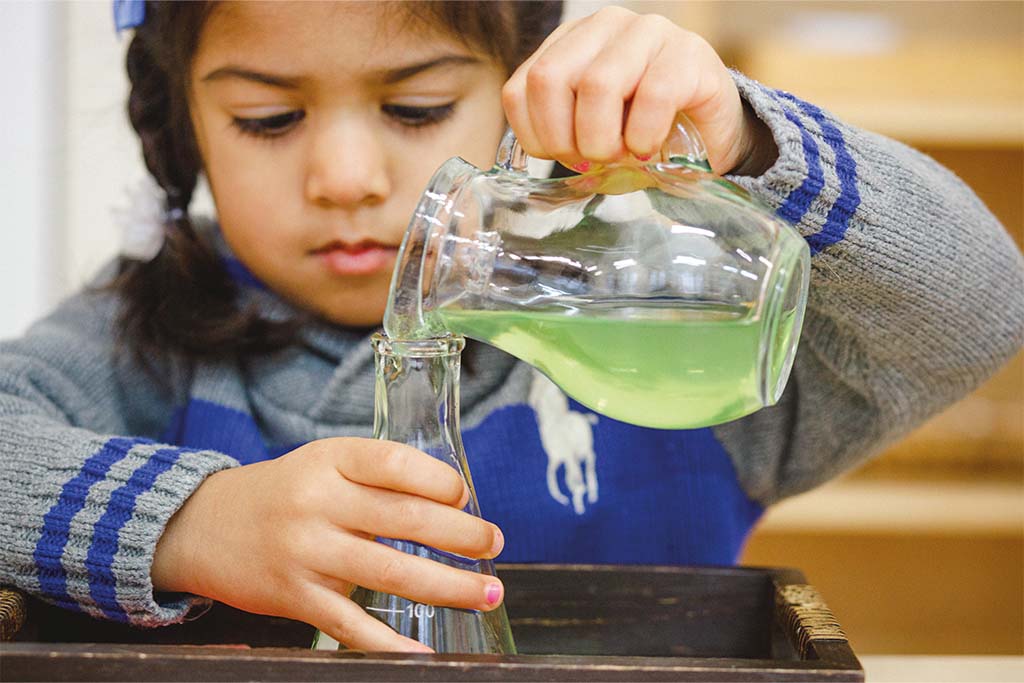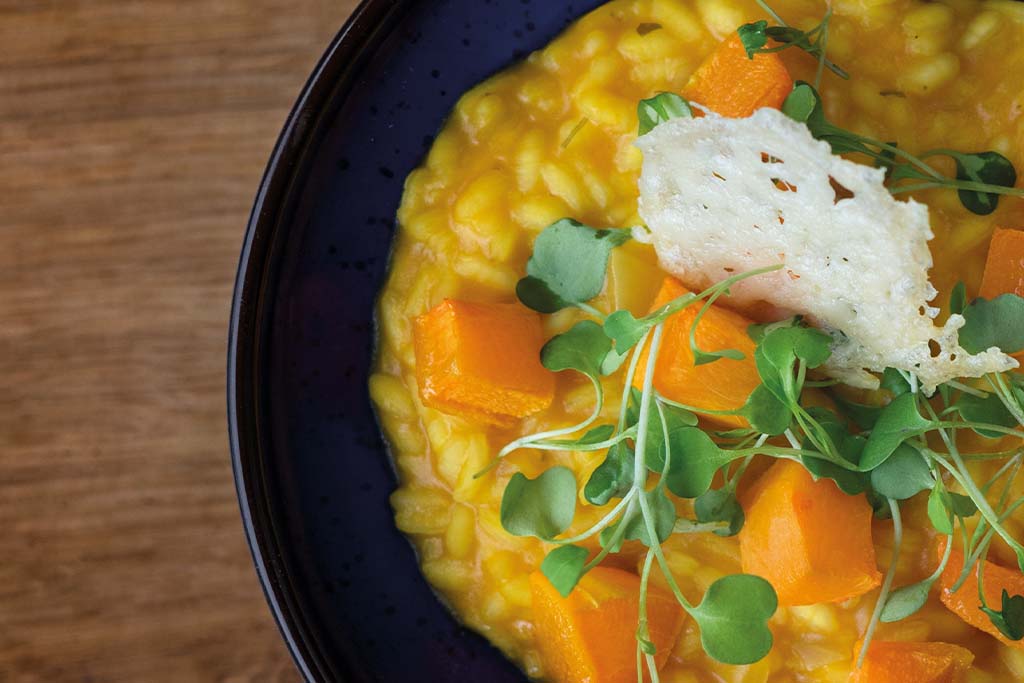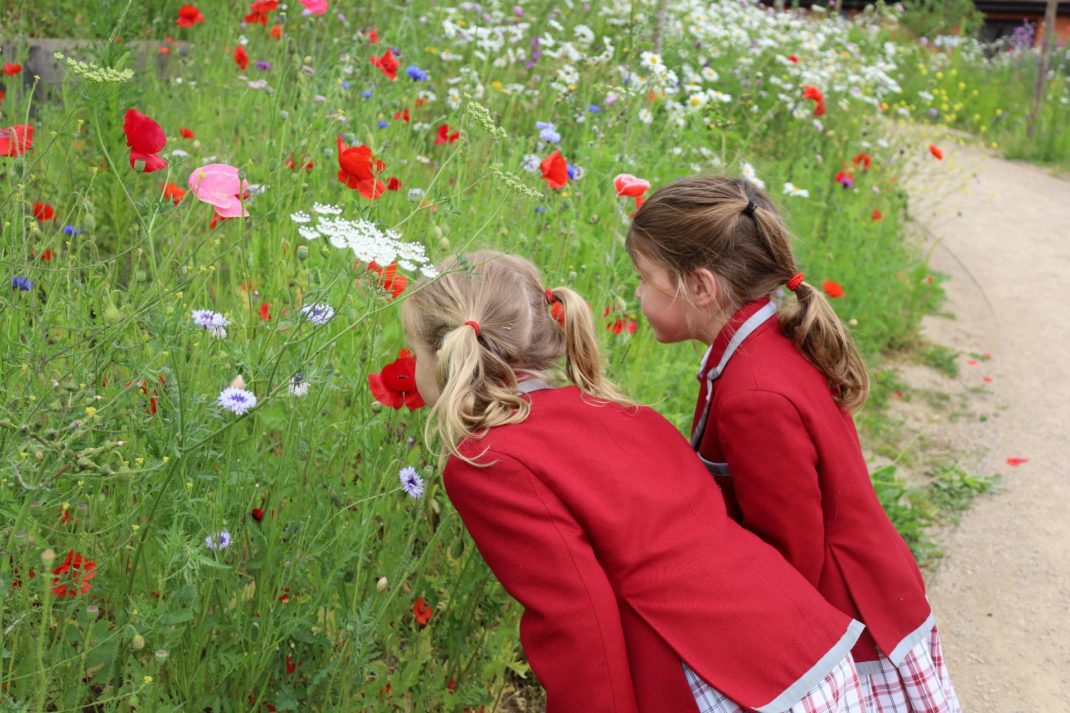In Good Taste
By
3 years ago

A healthy – and delicious – revolution in nursery food is underway, says Emma Reed

Nursery food. We often use the phrase pejoratively, to conjure up an image of colourless, bland purée. However, this image is becoming redundant; and in some nursery settings, it couldn’t be further from the truth. From dedicated chefs and herbologists, to international cuisine and organic suppliers, the most coveted nurseries are investing heavily in the palette of their young charges, taking them on a culinary journey that is enough to make adults envious. Food offered in educational settings in the UK still lags way behind countries such as Finland and France, but change is afoot. While there is more cost and effort involved in focusing on improving nutritional provision, nurseries are seeing benefits that extend way beyond that of an attractive-looking plate of food.
The Gardens Nursery in southwest London works closely with small organic suppliers to ensure food is of the best quality. Fish is sourced from Cornwall, cheese from a family run dairy based on a farm in West Sussex, and meat from animals reared on an organic farm in Devon. Perhaps the key ingredient to the tasty offerings at The Gardens is their chef, Raoul, along with his assistant, Lewis. The menu is seasonal and includes meat-free Mondays and fish Thursdays. Hearty breakfasts offer fresh porridge or scrambled eggs on toast, and snacks comprise fruit platters or crudités. ‘When we say homemade, we really do mean it,’ says The Gardens deputy manager, Daniela Riccio. ‘Oatcakes, breadsticks, biscuits and bread are all made in-house. We don’t buy them. Even with fish and chips we have homemade tomato ketchup.’

The Gardens has a policy of not using refined sugars or salt. ‘We do have sweet things on the menu,’ says Riccio, ‘but it’s sweetened with dried fruit instead of sugar. We also include savoury options such as muffins.’ The only time sugar is permitted is for birthdays. A child is allowed to choose a theme and Lewis will make a beautiful birthday cake. This approach of realism and moderation is also echoed by Claire Dimpfl, head of Tadpoles Nursery School in Chelsea. While they have a policy of not even allowing raisins or dried fruit, reflecting a push by Ofsted to increase teaching and awareness about oral health, Dimpfl acknowledges that you can’t really have a pile of fruit with a candle on it for a birthday. ‘Children are going to meet sugar and cake in their life and it’s about being reasonable.’ As a result, such treats are enjoyed with relish and savoured.
Having a herbologist on board may sound like something straight out of Harry Potter, but that’s what Paint Pots Montessori Nursery can boast at The Grove, Notting Hill. Maya Thomas has a diploma in Herbology from the Royal Botanic Gardens in Edinburgh, trained at the prestigious Ballymaloe Cookery School in Ireland, and has worked as a chef at Rushmore Primary School in Hackney as part of the ‘chefs in schools’ initiative. She also worked as a grower for Soho Farmhouse and her ancestors include Owen Thomas, head gardener at Windsor Castle in the 1890s and HH Thomas, a well-known writer on gardens. She has inherited knowledge about Ayurvedic medicine from her Sri-Lankan mother who was also a chef with a passion for gardening, serving as a huge inspiration to Thomas. With this pedigree and passion, it’s no wonder the children of Paint Pots have embarked on quite the culinary odyssey.

Thomas agrees that seasonality is key. One of the suppliers she uses is Fern Verrow, a biodynamic farm in Herefordshire. She’s keen that children make the connection between recognising food as it comes out of the ground and the end product.
When vegetables arrive from the supplier, she puts a bowl of them out, fresh from the ground, covered in soil, so the children can make use of their natural curiosity and examine it. ‘They like to look at it, particularly with something like a cabbage, seeing the veins on it in different colours,’ she says. How does Thomas tackle expanding young palettes, then? She finds that bringing the same meals back around every couple of weeks gets the children used to particular flavours, which can then be built upon.
One thing Thomas feels is lacking in the UK diet is bitter flavours found in certain vegetables, herbs and spices. ‘It’s important for good digestion and feeding the microbiome. There is no way to mimic what bitters do physiologically. You can’t take a capsule.’ As a result, she often puts out bowls of different salad leaves for the children to try. Even if they don’t take to a certain leaf first time around, they will still try it when it comes out next time. She takes a gentle approach to introducing new foods. One week, herbs and Swiss Chard are added to a frittata, for example.
Thomas also recognises the important role of foods with slow-release energy to sustain children through their active days. Porridge is popular, often served with stewed rhubarb or quince and ginger. Meat and fish are on the menu, but Thomas is conscious that introducing children to a more plant-based diet at this age not only does wonders for their health but serves to broaden their palette. It’s giving them the confidence to try new foods in innovative ways.
Thomas recalls the time she presented the children with beetroot pesto pasta. One girl was adamant she wasn’t going to eat it until she discovered a star-shaped piece of pasta. ‘Twenty minutes after everyone had left the table, she was still there eating every last bit, with purple all over her face.’

Despite their central London location, Tadpoles Nursery works hard to teach children about ‘field to fork,’ and make use of their garden where they have apple and pear trees and grow herbs and vegetables which they use for supplementing their catered meals from Chilli Bees Catering Company. Children also get involved with the planting. Dimpfl notes that a crop of tomatoes might be used to make a tomato sauce for pizza while potatoes can be baked on their fire pits. ‘We have a lovely herb bed the children can visit. It’s good to do a lot of sensory stuff. We’re not only tasting, we’re smelling and seeing how flavours change.’ Tadpoles holds Bronze and Silver Healthy Eating Awards and are working towards their Gold. Dimpfl is also conscious that in providing healthy, balanced organic meals, it reduces the pressure on busy parents.
There is so much more to food than its consumption, and these nurseries set great store in using food as both an educational and a social tool, enjoying the rituals and conversations around it. Rozzy Hyslop, Principal of Marmalade Schools, describes the ritual they have for trying new foods. ‘You kiss the food, poke it and try and have a little bite.’ Conversations take place around the table about the food they are eating; it becomes a special time.

Hyslop says that parents have commented how much easier it is taking their children out to restaurants and it’s also essential preparation for the transition to Reception. She also notes how children learn to become more adventurous by watching their peers. The emphasis is on making food fun. Behaviourally, Hyslop states that, because the children are eating nutritious lunches, they are much more settled in the afternoon and more receptive to learning to play nicely as they aren’t hungry and are devoid of the sugar spikes that come with some foods.
Riccio of The Gardens agrees. The older children learn how to serve themselves and they are taught how to use cutlery properly. They learn about other food cultures, celebrating Chinese New Year, eating homemade burgers for Independence Day along with sampling sushi and Vietnamese rolls. Thomas at Paint Pots also remarks how children will happily stay sitting, enjoying their food and chatting for prolonged periods of time.
At Tadpoles, children will cook a pudding for another class, helping with the weighing and stirring, or they might learn some science by making a jelly. Similarly at The Gardens, children are involved in cooking activities, mainly focused on savoury foods but with one sweet cooking activity a month.
It’s worth bearing in mind that these nurseries need to balance gastronomic endeavours along with catering for different allergies and special diets, which is no mean feat. One thing is certain: while these young children are learning about food, the range and quality of food they are being offered is giving them the very best start in their education by helping them, in turn, to learn.
Read more:



